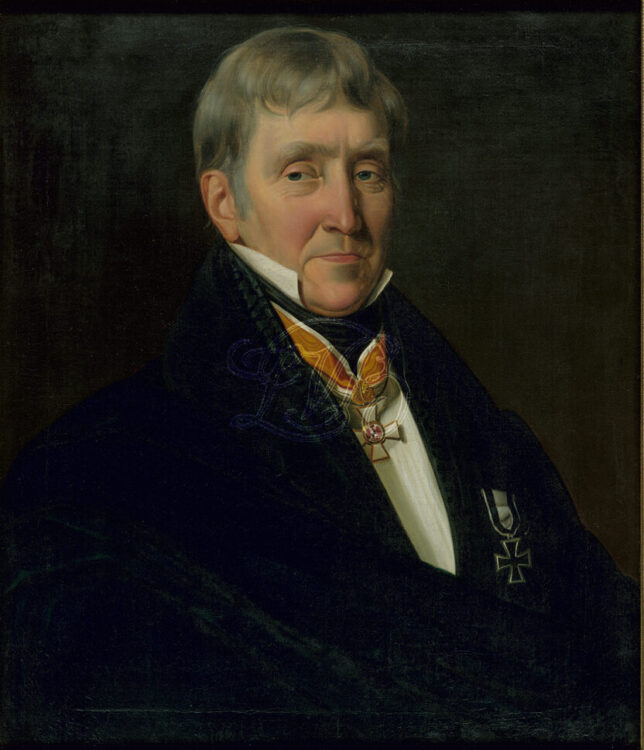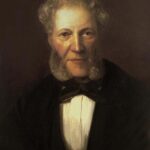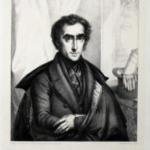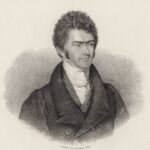Franz Gerhard Wegeler (22 August 1765 – 7 May 1848) was a childhood friend of Beethoven, someone important to him all his life. Despite their geographical distance and significant gaps in their intimate correspondence, Wegeler always remained a confidant and a reminder of their shared values learned in their youth, in Bonn.
It is safe to say, Franz Wegeler was Beethoven’s first real friend. Their relationship had started in their teens and lasted all the way till the end. The two had met when Beethoven was twelve. Wegeler was the older of the two with five years.
It was Wegeler who recommended him to the Breuning family, a local wealthy and highly sophisticated family, as a piano teacher for the kids Lorchen (Eleonore) and Lenz. The connection with the Breunings was very important and influential in Beethoven’s life. He called them “the guardian angels of my youth”. In fact, Beethoven fell in love with Lorchen – as he would often do with his piano students -, but it was his friend Wegeler to whom she later married.
He had studied medicine in the University of Bonn and later in Vienna. Once he became a physician he returned to Bonn, where he was a professor of medicine and obstetrics. In 1793, only at the age of twenty-seven, Wegeler had been elected to a rector position at the University. Highly remarkable progress! Franz Wegeler was also a practicing Freemason.
His ascent was short lived. As the French army approached the town, he signed a resolution forbidding medical students to have any contact with the French prisoners. Although the resolution aimed at keeping students away from typhus, it was interpreted as anti-French or anti-revolutionary (in fact Wegeler opposed the French Republic). Wegeler was in danger of guillotine and had to flee Bonn in a hurry. Beethoven welcomed his friend in Vienna and the two had a reunion in their relationship.
The friends had their good and bad times together. A letter written by Beethoven shows how he was as a friend: often hot tempered, but always with good intentions in his heart. Anytime, once his fury passed, he was ready and brave to apologize. He wrote this to Wegeler
“What a horrible picture you have shown me of myself! Oh, I admit that I do not deserve your friendship. You are so noble and well-meaning; and this is the first time that I dare not face you, for I have fallen far beneath you. Alas! For eight weeks now I have been a source of distress to my best and noblest friend. You believe that my goodness of heart had diminished. No, thank Heaven, for what made me behave to you like that was no deliberate, premeditated wickedness on my part, but my unpardonable thoughtlessness . . . Yet, oh do let me say this in my defense, I really was always good and ever tried to be upright and honorable in my actions. Otherwise how could you have loved me?”
Wegeler remained in Vienna until 1796 and after that he never saw his friend again, Beethoven.
Later that year another Bonn friend visited Vienna, Stephan von Breuning. After some time spent with Beethoven he concluded that he became more stable and a better judge of man. One of his letters shows us how deeply Beethoven appreciated Wegeler, saying “A hundred times, dear Wegeler, he has wished you were back with us, and he regrets nothing more than that he did not follow many of your suggestions”.
After Wegeler had left Vienna in 1796 the two communicated in letters. Although he was far from him in flash, Beethoven’s letters are full of brotherly love and intimacy. In 1801 he writes
“My Dear Kind Wegeler,
I do thank you most warmly for your remembrance of me which I have so little deserved or even endeavored to deserve where you are concerned. Yet you are so very good; you allow nothing, not even my unpardonable carelessness to put you off; and you are still the same faithful, kind and loyal friend—But you must never think that I could ever forget yourself and all of you who were once so dear and precious to me…”
This letter is the first time he tells about his hearing problems to anybody other than his doctors. He had been living under the menacing shadow of becoming deaf for some time now and it was time let the pressure out. He continues
“… I must confess that I lead a miserable life. For almost two years I have ceased to attend any social functions, just because I find it impossible to say to people: I am deaf…”
Wegeler’s special position is proven here, who is informed about the hearing loss even before his relatives. One can only imagine the sadness he must have felt for his friend, anticipating the end of his career as a musician. Beethoven also asks him advice concerning medicines and to talk to other doctors about novel treatments, like galvanism (treatment with electricity).
|Related: Beethoven’s deafness
In 1802 Wegeler married Eleonore von Breuning with whom they had four children. After spending five successful years in Bonn, being an instructor and general practitioner in medicine, the family moved to Koblenz. Here he was employed by the Prussian government as a medical councillor, improving the health and medical services.
Distant relationships seldom work. The two friends lost each other during the long coming years. In 1825, Wegeler finally broke the silence and sent Beethoven a letter. He addresses him in French, something from their youth
“My dear old Louis! … If you have not received a long letter every two months during the 28 years since I left Vienna, you may consider your silence in reaction to mine to be the first cause.”
In his long and nostalgic letter he informs Beethoven that he is sixty now, the family is healthy, and that his daughter plays Beethoven on piano, also his son studies medicine in Berlin. Wegeler also encloses a letter from his wife and first love of Beethoven, Eleonore. She invites him to visit his homeland and their family, talk about sweet memories of old. She concludes with a wish
“From this, dear Beethoven, you can see how you still live among us in these lasting memories. Just tell us once that this means something to you, and that you haven’t completely forgotten us.”.
Despite the kind letter and invitation, for some reason, Beethoven did not answer them for a year. At last next December he composed his reply to his old friend. He began with regrets for his delay, then he goes on to point out the reasons for their drifting apart saying, “Our drifting apart was due to the changes in our circumstances. Each of us had to pursue the purpose for which he was intended and endeavor to attain it.”
Their last correspondence was at the end, on Beethoven’s deathbed. He received a letter from Wegeler dated February 1, 1827. In this the doctor gave his professional opinion, encouraging him and suggesting he would recover. Best would be, he continues, to meet at Karlsbad spa and then travel together to Bonn. Sadly, this never happened, soon after the composer died.
More than a decade later Wegeler, together with Ferdinand Ries (Beethoven’s pupil and friend), published a Beethoven biography named Biographische Notizen über Ludwig van Beethoven. Their work in the book is considered by historians to be important and reliable.
Franz Gerhard Wegeler died in 1848.








